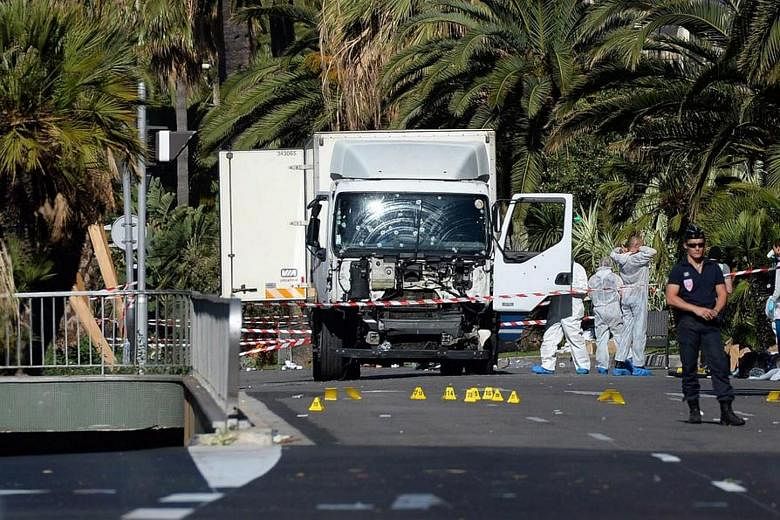BRUSSELS • European leaders and security chiefs have a sobering message after the Bastille Day killings in Nice: Such lone attacks using ordinary vehicles are nearly impossible to prevent and can be carried out by almost anyone.
"We have moved into a new era, and France will have to live with terrorism," Prime Minister Manuel Valls said yesterday morning after a Cabinet meeting led by President Francois Hollande.
His Belgian counterpart, Mr Charles Michel, said in Brussels - where Islamic State in Iraq and Syria (ISIS) militants staged attacks in March and where they planned last November's Paris attacks - that "zero risk does not exist".
"We are now faced with a different modus operandi," he said in the Belgian capital which, like cities in France, is still on a state of high alert with troops and heavily armed police on the streets and on guard at major public events.
Belgium has anticipated such risks, Mr Michel said, and is ready to protect its own national day festivities next Thursday.
Tunisian-born Frenchman Mohamed Lahouaiej-Bouhlel, with a record of violence but unknown to counter-terrorism agencies, drove a rented truck for 2km along the Promenade des Anglais seafront, mowing down revellers gathered there to watch a fireworks display.
Neighbours described the 31-year-old as a loner who never responded to their greetings.
One of them, Sebastien, said Lahouaiej-Bouhlel did not seem overtly religious, often dressed in shorts and sometimes wore work boots.
Of those interviewed, only one, a ground-floor resident, said she had some concerns about him, saying he was "a good-looking man who kept giving my two daughters the eye".
Tunisian security sources said Lahouaiej-Bouhlel came from the Tunisian town of Msaken, which he last visited four years ago.
He was not known by the Tunisian authorities to hold radical views, the sources said. He was married with three children, they added.
In striking the jewel of the French Riviera on a national holiday, the truck attack on Nice delivered a new blow to France's tourism sector already reeling from repeated terror attacks. Nice is the No. 2 destination in France behind Paris.
The attack was the third major strike against France in less than 18 months. It comes eight months after ISIS gunmen and suicide bombers attacked bars, restaurants, a concert hall and the national stadium in Paris, killing 130 people.
In January last year, 17 people were killed in another attack at various sites, including the Paris offices of the Charlie Hebdo magazine.
Mr Georges Panayotis, head of the MKG hotel and tourism consultancy, expressed concern about the effect the repeated attacks were having on the industry.
"This is no longer a classic terrorism situation where a couple of months is enough following an attack for economic activity to recover," he said.
France, the world's top tourism destination, welcomed nearly 84.5 million visitors last year. But the number of tourists arriving on regular flights has fallen by 5.8 per cent since January, including by 11 per cent in Paris.
REUTERS, AGENCE FRANCE-PRESSE

